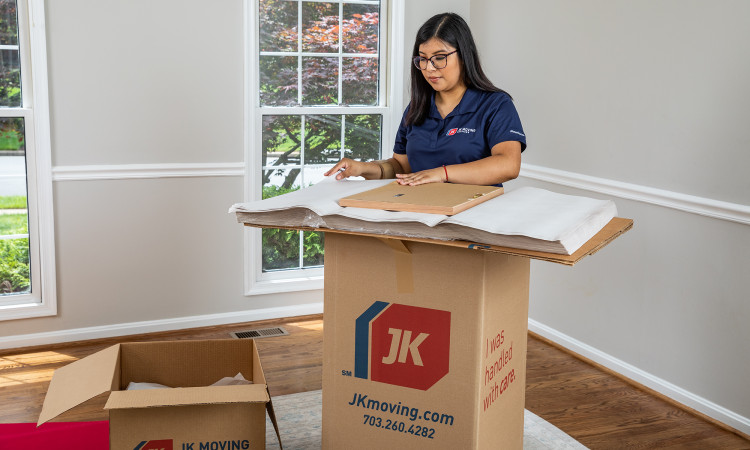Moving to a new home is an exciting adventure, but it can also be stressful, especially when it comes to packing. To ensure a smooth transition, it’s crucial to know what items should be left behind or handled with special care. Here are some essential tips on what not to pack for a safe and efficient move.
It’s common sense; you know you can’t pack everything, but sometimes it’s easy to forget. So keep these packing tips handy. Have a question about an item? Contact your move coordinator.
What you should pack
JK is committed to delivering you a worry-free residential move. That’s why there are certain items we can’t load onto our trucks or place into storage, such as:
- Cash
- Jewelry
- Credit cards, Social Security cards, and licenses
- Legal documents such as deeds, wills, and car and home titles
- Medical records
- Irreplaceable mementos, such as photo albums
What not to pack when moving
There are some things that should not make the move at all because they’re too dangerous to ship in trucks, air cargo planes, or shipping containers. Your move coordinator will help you find ways to store, personally transport, or dispose.
Hazardous Materials
Certain substances can pose significant risks during the moving process. These include:
-
-
- Flammable items: Such as gasoline, lighter fluid, and propane tanks.
- Chemicals: Paint, fertilizers, and pesticides can be dangerous and are typically prohibited by moving companies.
- Batteries: Car batteries and other rechargeable batteries can leak or explode.
-
Tip: Check local regulations for disposal guidelines and take hazardous materials to a designated facility.
Perishable Food
While it may be tempting to pack up your pantry, perishable food can spoil and create a mess during the move. Avoid packing:
- Fruits and vegetables: These can go bad quickly, especially during long-distance moves.
- Frozen items: Meat, dairy, and other frozen goods can thaw and spoil.
- Open food containers: Unsealed jars and boxes can leak and cause damage.
Tip: Plan to consume or donate perishable items before moving day.
Furniture and Large Appliances
Some items may not be suitable for moving due to their size or fragility. Consider leaving behind:
- Old or damaged furniture: If it’s not in good condition, it might not be worth the effort to move.
- Large appliances: If they’re outdated or inefficient, consider buying new ones for your new home.
Tip: Measure your furniture and doorways to ensure everything will fit in your new space.
Plants
Many moving companies have restrictions on transporting live plants, as they can be sensitive to changes in temperature and light.
Tip: If you can’t bear to leave your plants behind, consider taking cuttings or repotting them into smaller containers that can be easily transported.
Pets
While your furry friends are part of the family, moving them requires special consideration.
- Safety: Pets can become stressed during a move and may escape if not properly secured.
- Travel arrangements: Make sure you have a plan for transporting your pets safely.
Tip: Consider booking a pet sitter or a separate travel plan for your pets on moving day.
For a smooth move, consider this moving checklist:
- Heavy Items: Ensure proper handling of heavy items.
- Moving Box: Use sturdy moving boxes for secure packing.
- Bubble Wrap: Safeguard fragile items with bubble wrap.
- Moving Supplies: Gather packing tape, markers, and other supplies.
- Pack for a Move: Organize and pack systematically.
- Packing Boxes: Label boxes with contents and destination rooms.
- Storage Bags: Utilize bags for items like clothing on hangers.
- Start Packing: Begin packing well in advance.
- Moving Day: Plan and coordinate for a smooth moving day.
- Packing Supplies: Ensure you have all necessary supplies.
- Fragile Items: Handle and pack fragile items with care.
- Clothing on Hangers: Use specialized boxes or bags.
- Moving Company: Consider hiring professional movers.
- Packing Checklist: Follow a packing checklist for organization.
- Trash Bags: Keep trash bags for quick cleanup.
Here’s a handy flyer you can download or print to remind you of our packing tips for safe moving.

Packing for a move doesn’t have to be overwhelming. By knowing what to pack and what not to pack, you can focus on the essentials and make your moving experience as safe and efficient as possible. If you need assistance with your move, consider reaching out to a professional moving company like JK Moving Services for expert help.


